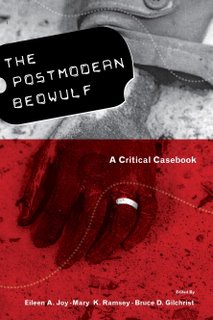
I've mentioned this new book in passing a few times on the pages of this blog. Here is a short excerpt from the preface that well captures the volume's ample ambition, followed by its table of contents. (Yes, the book has both a preface and a substantial introduction called "Liquid Beowulf" [which I've read and it is wonderful]. Eileen Joy must be a terribly prolix person).
Look for The Postmodern Beowulf this autumn via West Virginia University Press.
The attempt to restore historical complexity to our understanding of the past and its cultural forms, and to also show how Old English studies both practice and reformulate theory, suffices as a description of the project of The Postmodern Beowulf, which was initially born out of a desire to provide for students an anthology of “the best of” contemporary critical approaches to the poem and then later developed into a “casebook” that we hope more than amply demonstrates the ways in which Old English scholarship has debated, elucidated, practiced, historicized, and even developed theory in relation to the critical analysis of Beowulf. The book is divided into four sections—History/Historicism, Ethnography/Psychoanalysis, Gender/Identity, and Text/Textuality—that have been designed, not as much to represent specific movements within theory (such as deconstruction, new historicism, post-colonialism, Lacanian analysis, queer studies, and the like), as to offer broad contextual fields of inquiry within which certain questions regarding history, culture, identity, and language have perdured over time (and in response to which questions the more narrowly-defined theoretical “schools” have arisen). This is not to say that specific theoretical approaches are not purposefully highlighted in the volume, because many of them are, but it was also our concern to select essays that took up more than one narrowly-defined approach and that also combined approaches (both traditional and more contemporary) in strikingly innovative ways.
Table of Contents
Preface: Eileen A. Joy, "After Everything, The Postmodern Beowulf"
I. INTRODUCTION
Eileen A. Joy and Mary K. Ramsey, "Liquid Beowulf" [original essay]
II. HISTORY/HISTORICISM
CRITICAL CONTEXTS
Edward Said, "The World, the Text, and the Critic" [originally published in: Edward Said, The World, the Text, and the Critic (Cambridge, MA: Harvard University Press, 1983), 31-53]
Claire Sponsler, "In Transit: Theorizing Cultural Appropriation in Medieval Europe" [originally published in: Journal of Early Modern and Medieval Studies 32.1 (Winter 2002): 17-39]
BEOWULF
Nicholas Howe, "Beowulf and the Ancestral Homeland" [originally published in: Nicholas Howe, Migration and Mythmaking in Anglo-Saxon England (1989; Notre Dame, IN: University of Notre Dame Press, 2001), 143-80]
Allen J. Frantzen, "Writing the Unreadable Beowulf" [originally published in: Allen J. Frantzen, Desire for Origins: New Language, Old English, and Teaching the Tradition (New Brunswick, NJ: Rutgers University Press, 1990), 168-200]
John D. Niles, "Locating Beowulf in Literary History" [originally published in: Exemplaria 5 (March 1993): 79-109]
III. ETHNOGRAPHY/PSYCHOANALYSIS
CRITICAL CONTEXTS
Alfred K. Siewers, "Landscapes of Conversion: Guthlac’s Mound and Grendel’s Mere as Expressions of Anglo-Saxon Nation-Building" [originally published in: Viator 34 [2003]: 1-39]
John Moreland, "Ethnicity, Power and the English" [originally published in: William O. Frazer and Andrew Tyrell, eds., Social Identity in Early Medieval Britain (London: Leicester University Press, 2000), 23-51]
BEOWULF
James W. Earl, "Beowulf and the Origins of Civilization" [originally published in: James W. Earl, Thinking About Beowulf (Stanford, CA: Stanford University Press, 1994), 161-88]
John M. Hill, "The Ethnopsychology of In-Law Feud and the Remaking of Group Identity in Beowulf: The Cases of Hengest and Ingeld" [originally published in: Philological Quarterly 78 (1999): 97-123]
Janet Thormann, "Enjoyment of Violence and Desire for History in Beowulf" [original essay]
IV. GENDER/IDENTITY
CRITICAL CONTEXTS
Carol J. Clover, "Regardless of Sex: Men, Women, and Power in Early Northern Europe" [originally published in: Speculum 68.2 (April 1993): 363-87]
Jeffrey Jerome Cohen, "The Ruins of Identity" [originally published in: Jeffrey J. Cohen, Of Giants: Sex, Monsters, and the Middle Ages (Minneapolis, MN: University of Minnesota Press, 1994), 1-28]
BEOWULF
Clare A. Lees, "Men and Beowulf" [originally published in: Clare A. Lees, ed., Medieval Masculinities: Regarding Men in the Middle Ages (Minneapolis, MN: University of Minnesota Press, 1994), 129-48]
Mary Dockray-Miller, "Beowulf’s Tears of Fatherhood" [originally published in: Exemplaria 10 (1998): 1-28]
Shari Horner, "Voices from the Margins: Women and Textual Enclosure in Beowulf" [originally published in: Shari Horner, The Discourse of Enclosure (Albany, NY: State University of New York Press, 2001), 65-100]
V. TEXT/TEXTUALITY
CRITICAL CONTEXTS
Michel Foucault, "What is an Author?" [originally published in: Josué V. Harari, ed., Textual Strategies: Perspectives in Post-Structuralist Criticism (Ithaca, NY: Cornell University Press, 1979), 141-60]
Carol Braun Pasternack, "The Textuality of Old English Poetry" [originally published in: Carol Braun Pasternack, The Textuality of Old English Poetry (Cambridge: Cambridge University Press, 1995), 1-32]
BEOWULF
Gillian Overing, "Swords and Signs: Dynamic Semiosis in Beowulf" [originally published in: Gillian Overing, Langage, Sign, and Gender in Beowulf (Carbondale, IL: Southern Illinois University Press, 1990), 33-67]
Seth Lerer, "Hrothgar’s Hilt and the Reader in Beowulf" [originally published in: Seth Lerer, Literacy and Power in Anglo-Saxon England (Lincoln, NE: University of Nebraska Press, 1991), 158-94]
Susan M. Kim, "As I Once Did With Grendel: Boasting and Nostalgia in Beowulf" [originally published in: Modern Philology 103.1 (August 2005): 4-27]
POST-SCRIPT
Michelle R. Warren, "Post-Philology" [originally published in: Patricia Clare Ingham and Michelle R. Warren, eds., Post-Colonial Moves: Medieval through Modern (New York: Palgrave Macmillan, 2003), 19-45]
Afterword: James W. Earl, "Reading Beowulf with Original Eyes" [original essay]
No comments:
Post a Comment